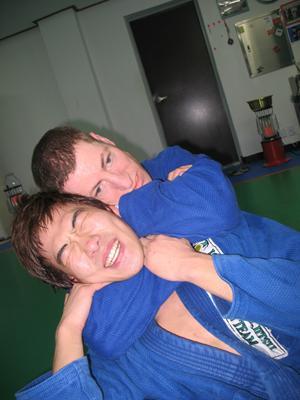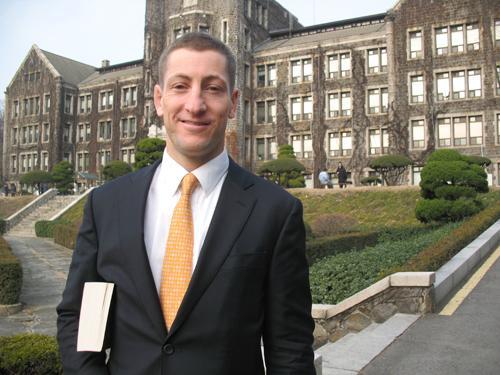 |
Frankl at work in Brazilian jiu-jitsu session (Yonhap News) |
 |
John Frankl displaying his academic side while on campus (Yonhap News) |
He is currently researching and translating the essays of famous poet Yi Sang (1910-1937), which cover a broad variety of colonial-era issues. He will be taking a one year sabbatical at Harvard in 2012 to produce a book.
Ironically, as Frankl’s interest in Korea grew, his interest in Korean martial arts waned.
“In kuk sool, you would do solo forms and joint-locking, but when you sparred, it was kickboxing,” he said. He sought more realistic Thai and Philippino training, and even studied under Bruce Lee student Dan Inosanto before settling on Brazilian jiu-jitsu, or BJJ. “In BJJ, you spar the way you train,” he said.
BJJ is a brilliantly effective offshoot of the original Japanese martial art that also spawned the sport of judo. Its specialization in ground fighting makes it a must for competitors in the mixed martial arts tournaments that have revolutionized combative training globally following the advent of the Ultimate Fighting Championship, or UFC, in the United States in the early 1990s.
Frankl learned BJJ under the famous masters Rickson Gracie and Roberto Maia, and introduced it to Korea as a brown belt in 1999. His students include the U.S. Special Forces and he was once asked to teach one of Korea’s richest men and his security detail at his private gym. When Frankl suggested the gentleman visit his public dojang, the man decided to find another instructor.
In a land where a taekwondo black belt can be earned in less than a year, Frankl has only promoted five men to that grade. “It is BJJ; I have not Koreanized it,” he said. “I’m doing it the way I learned it: 10 years to black belt, give or take.”
His first black belt is fellow American Stephen Capener. Capener, a professor of interpretation who is himself no martial arts neophyte ― he holds a seventh degree black belt in taekwondo ― praises Frankl’s approach.
“John has got an education and brings that to his teaching,” he said. “And after a certain age in Korean martial arts, most masters stop training and become armchair quarterbacks, but John is constantly researching and evolving.”
Indeed: Frankl takes five-six sessions per week, sparring all comers. The “John Frankl Competition Team” now competes locally and as far afield as Abu Dhabi.
Though his own students are exclusively adults, with backgrounds ranging from taxi driving to academia, Frankl bemoans the fact that in Korea generally, dojangs are largely the domain of children as adults gravitate toward golf and karaoke.
“In the U.S., Japan and Brazil, martial arts are very much an adult pursuit, something middle-class professionals do,” he said. “Lifestyle balance is not a priority in Korea. By the time they are 30, Koreans are under pressure to go out with the people they spent the last 12 hours with.”
Yet among Yonsei’s dreaming spires, customarily inhabited by frail and bespectacled professors, his hobby is not considered thuggish.
“Yonsei professors think it’s cool, they admire it as it is associated with the UFC, which is a televised sport,” he said.
Next year, while researching Yi Sang at Harvard, Frankl plans to compete in the U.S. at a level of BJJ competition that is currently unavailable in Korea. But after that, he will be back.
“I like Korea. I like the direction it is moving,” he said, “I feel really comfortable here.”
(Yonhap News)







![[Weekender] Korea's traditional sauce culture gains global recognition](http://res.heraldm.com/phpwas/restmb_idxmake.php?idx=644&simg=/content/image/2024/11/21/20241121050153_0.jpg)